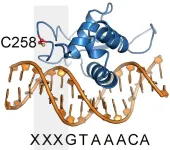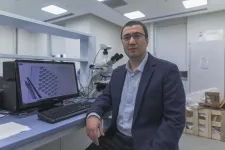(Press-News.org) LA JOLLA, CA—Hormone-driven cancers, like those of the breast and prostate, often rely on a tricky-to-target protein called Forkhead box protein 1 (FOXA1). FOXA1 mutations can enable these types of cancers to grow and proliferate. Today, FOXA1 is notoriously difficult to block with drugs—but that may soon change.
Scripps Research scientists have identified a crucial binding site on FOXA1 that could pave the way for future cancer treatments. The team’s findings, which were published in Molecular Cell on October 15, 2024, also mapped out how tiny drug-like chemical compounds—called small molecules—interact with the protein.
While examining protein interactions on a large scale, investigators in the lab of co-corresponding author Benjamin Cravatt, PhD, the Norton B. Gilula Chair in Biology and Chemistry, determined that small molecules could, in fact, interact with FOXA1.
“FOXA1 had historically been considered undruggable,” says Cravatt. “It’s thought to lack the types of surfaces that small molecule drugs can bind to, which is likely why it’s been so difficult to target the protein.”
Following its discovery, Cravatt’s lab teamed up with the lab of Michael Erb, PhD, to better understand how those molecules might affect the functions of FOXA1.
Both Cravatt and Erb used two forms of activity-based protein profiling (ABPP), a technique that Cravatt’s lab pioneered to capture protein activity on a global scale. The dual approach allowed them not only to determine whether a small molecule could bind to FOAX1 at all, but also to pinpoint the exact binding site.
Erb and his group are particularly interested in how certain genes are turned “on” and “off” by proteins called transcription factors, and how this leads to cell states that cause cancer. Transcription factors like FOXA1 bind to specific regions of DNA and control whether a gene is activated (turned “on”) or repressed (turned “off”). This regulation is essential to how cells function and respond to changes—such as in the case of hormone-driven cancers, which often depend on FOXA1 to grow.
“FOXA1 is a master regulator of gene control, or what we call a lineage-defining factor,” says Erb, the study’s co-corresponding author and an associate professor in the Department of Chemistry. “We found a specific site on FOXA1 that can bind to small molecules, which is a tremendously important discovery since transcription factors like FOXA1 are not only attractive targets for cancer, but also many other diseases.”
Because it’s so rare to find a small molecule binding site on a transcription factor, the discovery was unexpected.
“A common analogy is that drugs bind to proteins like keys inside a lock, but the prevailing attitude is that most transcription factors don’t have binding sites to unlock,” adds Erb. “The binding site on FOXA1 is like a hidden lock; without the ABPP technology as it exists today, it’s hard to imagine how we would have discovered it.”
Another surprising finding: FOXA1 usually binds to a distinct sequence of DNA bases to control gene regulation—but binding FOXA1 to small molecules changed the sequences that it preferred, allowing the protein to target different genes than it normally would.
This discovery may help future researchers understand how such molecules affect gene regulation in cancer. If small molecules alter FOXA1’s DNA preferences, they could influence which genes are turned on or off—potentially affecting cancer growth.
“We found small molecules could impact FOXA1’s ability to interpret the information written into the genome,” says Erb.
Furthermore, the team determined that certain mutations in FOXA1 affected areas close to where small molecules could attach to the protein. These mutations changed how FOXA1 interacted with DNA—in the exact same way that the small molecules did.
“This suggests that a hotspot for cancer-associated mutations is also a hotspot for small molecule binding events,” points out Erb.
Contrary to what they originally thought, the researchers found that small molecules couldn’t just attach to FOXA1 on their own. Instead, they could only bind to FOXA1 when the protein was already bound to DNA sequences—meaning the effectiveness of small molecules as cancer treatments probably relies on FOXA1’s interactions with DNA.
Looking ahead, Erb and Cravatt plan to explore the optimization of FOXA1 ligands into antagonists of its function and cancer growth, as well as to use ABPP to search for small molecule binding sites on transcription factors beyond FOXA1 that are currently considered undruggable.
“Now that we’ve created chemical probes to study FOXA1, we hope our research inspires the development of drugs that can target the protein,” says Cravatt.
In addition to Cravatt and Erb, authors of the study, “Redirecting the pioneering function of FOXA1 with covalent small molecules,” include Sang Joon Won, Yuxiang Zhang, Christopher J. Reinhardt, Lauren M. Hargis, Nicole S. MacRae, Kristen E. DeMeester, Evert Njomen, Jarrett R. Remsberg and Bruno Melillo of Scripps Research.
This work was supported by funding from the Howard Hughes Medical Institute Hanna H. Gray Fellowship (GT15176); the Jane Coffin Childs Memorial Fellowship; the National Institutes of Health (F32 CA265211, R35 CA231991, DP5-OD26380 and 1R01CA280720-01A1); and the Ono Pharma Breakthrough Science Initiative Awards Program.
//
About Scripps Research
Scripps Research is an independent, nonprofit biomedical institute ranked one of the most influential in the world for its impact on innovation by Nature Index. We are advancing human health through profound discoveries that address pressing medical concerns around the globe. Our drug discovery and development division, Calibr-Skaggs, works hand-in-hand with scientists across disciplines to bring new medicines to patients as quickly and efficiently as possible, while teams at Scripps Research Translational Institute harness genomics, digital medicine and cutting-edge informatics to understand individual health and render more effective healthcare. Scripps Research also trains the next generation of leading scientists at our Skaggs Graduate School, consistently named among the top 10 US programs for chemistry and biological sciences. Learn more at www.scripps.edu.
END
Scripps Research scientists discover chemical probes for previously “undruggable” cancer target
Scientists uncover how small molecules interact with a cancer-related protein called FOXA1 and identify a crucial binding site on its surface.
2024-10-15
ELSE PRESS RELEASES FROM THIS DATE:
Giant Magellan telescope begins primary mirror support system testing
2024-10-15
TUCSON, AZ — October 15, 2024 — The Giant Magellan Telescope today announced the successful installation of one of its completed 8.4-meter-diameter primary mirrors into a support system prototype at the University of Arizona’s Richard F. Caris Mirror Lab. This highly sophisticated system — comparable in size to half a basketball court and containing three times the number of parts of a typical car — is vital to the telescope’s optical performance and precision control. The milestone marks the start of a six-month optical testing phase to demonstrate that the support system can control the mirror as required, validating the revolutionary capabilities ...
Experimental cancer drug eliminates bone metastases caused by breast cancer in lab models
2024-10-15
In a new study led by Johns Hopkins Medicine, the drug RK-33 has demonstrated promise in treating breast cancer that has spread to the bone (breast cancer bone metastasis). RK-33 was previously shown to help treat other types of cancer and viral illnesses.
Patients with breast cancer and bone metastasis have limited treatment options and often rely on palliative care to ease difficult symptoms, including frailty and pain. In most cases, breast cancer with bone metastasis is incurable.
Now, corresponding author Venu Raman, Ph.D., ...
Political candidates who fight climate change stand to benefit in election
2024-10-15
A majority of Floridians expressed support for political candidates who fight climate change in a new Florida Atlantic University survey. The survey found that nearly 52% of respondents agreed that a candidate with a record of reducing climate impacts was more likely to get their vote.
The Invading Sea’s Florida Climate Survey also revealed strong support in the state for increasing renewable energy use and teaching climate science in K-12 classrooms. The survey is the 11th conducted by the FAU Center for Environmental Studies ...
Stand up to Cancer announces new grants supporting pioneering research in six cancer types
2024-10-15
LOS ANGELES – Oct. 15, 2024 – Stand Up To Cancer® (SU2C) today announced grants to several teams of leading cancer investigators in support of cutting-edge research in a variety of cancers including head and neck, pediatric, pancreatic, breast, rectal and gastro-esophageal cancers, as well as research focused on how the microbiome communicates with the immune system.
“These new grants emphasize SU2C’s support of collaborative, trailblazing research that pushes the field forward and helps people impacted by some of the most common or difficult-to-treat cancers,” said Julian Adams, Ph.D., president and CEO of SU2C. “With an emphasis on answering ...
Researchers awarded $1.3M to help military Veterans battling Acute Myeloid Leukemia
2024-10-15
CLEVELAND—With a new four-year, $1.3 million grant from the U.S. Department of Veterans Affairs, researchers at Case Western Reserve University are investigating a new approach to treat Acute Myeloid Leukemia (AML) in military Veterans.
AML is the most common form of blood cancer in adults, and many patients suffer relapses—especially Veterans, due to exposure to harmful chemicals and radiation during active duty, according to the National Center for Biotechnology Information.
There is no effective treatment for AML and, according to the National Institutes of Health, half of treated patients suffer a relapse after therapy—mainly ...
New hub for high-energy astrophysics — CTAO Science Data Management Centre opens at DESY in Zeuthen
2024-10-15
Zeuthen, Germany – On 14 October 2024, the Cherenkov Telescope Array Observatory (CTAO), along with hosting partners and shareholders Deutsches Elektronen-Synchrotron DESY, celebrated the official inauguration of the Science Data Management Centre (SDMC) on the DESY campus in Zeuthen, Germany.
The ceremony, chaired by Prof. Christian Stegmann, Head of DESY Zeuthen, was opened by Mario Brandenburg, Parliamentary State Secretary at the German Federal Ministry of Education and Research (BMBF), and Tobias Dünow, State Secretary at ...
JMIR publications CEO and Executive Editor Gunther Eysenbach achieves #1 ranking as most cited researcher in Medical Informatics for fifth consecutive year
2024-10-15
Toronto, ON (October 14, 2024) – JMIR Publications is proud to announce that Gunther Eysenbach, founder, CEO and executive editor, has once again been named the #1 most cited researcher in the subfield of medical informatics by Stanford/Elsevier’s Top 2% Scientists rankings. This marks the fifth consecutive year that Dr Eysenbach has secured this prestigious position, reaffirming his status as a leading authority and driving force in the field. He is also ranked #36 in the Top 100 Scientists in Information & Communication ...
ERC grant for groundbreaking wearable health tech
2024-10-15
Dr. Levent Beker from the Department of Mechanical Engineering at Koç University, once again received European Research Council (ERC) support for his scientific research that focuses on improving the quality of our daily lives.
His previous project on an implant that can detect signs of heart failure and degrade in the body without surgery was granted €2.5 million Starting Grant from the ERC. Last year, his research on a wireless micro sensor that enables real-time monitoring of food spoilage at supermarkets, was published in Nature FoodMagazine.
Currently leading the Bio-integrated ...
NIH announces winners of prize competition to improve postpartum maternal health and health equity through innovative diagnostics
2024-10-15
The National Institutes of Health (NIH) has announced the winners of the Rapid Acceleration of Diagnostics Technology (RADx® Tech) for Maternal Health Challenge, an $8 million prize competition to encourage development of postpartum maternal health diagnostics for use in regions that have limited access to maternity care. The eight winning teams developed home-based and point-of-care diagnostics, wearables and other accessible technologies to improve postpartum health outcomes during the period when most maternal deaths occur—up to one year after delivery or the end of ...
APS and SPR honor Dr. Cynthia F. Bearer with the 2025 Mary Ellen Avery Neonatal Research Award
2024-10-15
October 15, 2024 – The American Pediatric Society (APS) and the Society for Pediatric Research (SPR) are pleased to announce Cynthia F. Bearer, MD, PhD, as the 2025 Mary Ellen Avery Neonatal Research Award recipient. This award honors a pediatric investigator who has made important contributions to neonatal health through basic or translational research.
Dr. Bearer is the William & Lois Briggs Chair of Neonatology and Chief, Division of Neonatology, Rainbow Babies & Children’s Hospital and Professor of Pediatrics & Neurosciences at Case Western Reserve University. ...
LAST 30 PRESS RELEASES:
Public and patient involvement in research is a balancing act of power
Scientists discover “bacterial constipation,” a new disease caused by gut-drying bacteria
DGIST identifies “magic blueprint” for converting carbon dioxide into resources through atom-level catalyst design
COVID-19 vaccination during pregnancy may help prevent preeclampsia
Menopausal hormone therapy not linked to increased risk of death
Chronic shortage of family doctors in England, reveals BMJ analysis
Booster jabs reduce the risks of COVID-19 deaths, study finds
Screening increases survival rate for stage IV breast cancer by 60%
ACC announces inaugural fellow for the Thad and Gerry Waites Rural Cardiovascular Research Fellowship
University of Oklahoma researchers develop durable hybrid materials for faster radiation detection
Medicaid disenrollment spikes at age 19, study finds
Turning agricultural waste into advanced materials: Review highlights how torrefaction could power a sustainable carbon future
New study warns emerging pollutants in livestock and aquaculture waste may threaten ecosystems and public health
Integrated rice–aquatic farming systems may hold the key to smarter nitrogen use and lower agricultural emissions
Hope for global banana farming in genetic discovery
Mirror image pheromones help beetles swipe right
Prenatal lead exposure related to worse cognitive function in adults
Research alert: Understanding substance use across the full spectrum of sexual identity
Pekingese, Shih Tzu and Staffordshire Bull Terrier among twelve dog breeds at risk of serious breathing condition
Selected dog breeds with most breathing trouble identified in new study
Interplay of class and gender may influence social judgments differently between cultures
Pollen counts can be predicted by machine learning models using meteorological data with more than 80% accuracy even a week ahead, for both grass and birch tree pollen, which could be key in effective
Rewriting our understanding of early hominin dispersal to Eurasia
Rising simultaneous wildfire risk compromises international firefighting efforts
Honey bee "dance floors" can be accurately located with a new method, mapping where in the hive forager bees perform waggle dances to signal the location of pollen and nectar for their nestmates
Exercise and nutritional drinks can reduce the need for care in dementia
Michelson Medical Research Foundation awards $750,000 to rising immunology leaders
SfN announces Early Career Policy Ambassadors Class of 2026
Spiritual practices strongly associated with reduced risk for hazardous alcohol and drug use
Novel vaccine protects against C. diff disease and recurrence
[Press-News.org] Scripps Research scientists discover chemical probes for previously “undruggable” cancer targetScientists uncover how small molecules interact with a cancer-related protein called FOXA1 and identify a crucial binding site on its surface.








